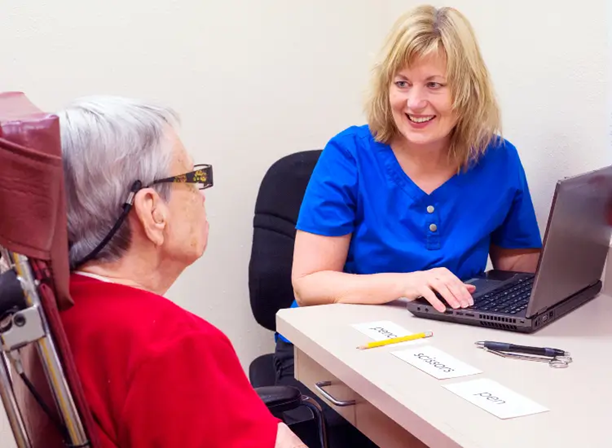Speech therapy is a proven way to alleviate communication disorders and symptoms of many life-altering conditions. Patients often find it difficult to travel to the clinic and receive this service in person. But Southeast and Southwest Houston residents don’t need to worry—BrightStar Care offers in-home speech therapy for our valued clients. This service can significantly improve a patient’s quality of life, and we’re proud to provide it in the comfort and safety of our home. Delve deeper into speech therapy and the difference it can make for your loved one.

What Is In-Home Speech Therapy?
In-home speech therapy offers a practical solution to communication disorders and the symptoms of stroke, dementia, and Parkinson’s disease. It brings the expertise of speech-language pathologists directly to seniors’ living rooms. This not only reduces the physical strain but also allows sessions to be conducted in a familiar environment, which can have a marked impact on the effectiveness of the therapy. Just like in a clinical setting, therapists create personalized treatment plans that cater to the individual needs of each senior.
Conditions Treated With Speech Therapy
Over the years, our caregivers have helped countless patients dealing with disorders affecting speech and communication. We often recommend speech therapy in the home for the following conditions:
- Stroke—Strokes can lead to aphasia, a condition that affects the ability to communicate. In-home speech therapists use targeted exercises to help patients regain their speech and language abilities and improve their quality of life.
- Progressive Neurological Disorders—Conditions like Parkinson’s disease and dementia progressively impair speech. Regular in-home therapy sessions can slow the progression of these symptoms and allow seniors to maintain their communication skills for as long as possible.
- Swallowing Disorders—Swallowing difficulties (dysphagia) are common among older folks, often due to underlying medical conditions. Speech therapists are trained to provide exercises and strategies to improve swallowing safety and efficiency.
What to Expect During a Session
Those who have never had in-home care before may not know what to expect for their first in-home speech therapy session. Fortunately, our team is here to ensure you feel comfortable with the experience. Here’s how a typical session goes:
- Preparation—Before the session begins, create a quiet and comfortable space for your loved one to meet with their provider. Choose a well-lit area where there won’t be interruptions.
- Warm-Up Activities—Now it’s time for the session to begin! Sessions often start with warm-up activities to engage the patient and prepare them for the more intensive exercises ahead. These might include simple conversations or cognitive games.
- Targeted Exercises and Techniques—After that, your loved one’s licensed speech therapist will guide them through targeted exercises that address specific needs. These could include speech drills, language activities, or swallowing exercises.
- Cool Down and Recap—Sessions typically end with a cool-down period, a progress review, and feedback for the patient. After some sessions, your loved one might get homework or exercises to practice between sessions.
Overcoming Challenges in Speech Therapy
Speech therapy comes with a set of challenges, even when conducted at home. Motivational issues come up all the time. Patients can feel frustrated with seemingly slow progress and no longer want to put in the effort. They may also have health issues that interrupt therapy, further contributing to their frustration. It’s essential to create a supportive environment for your loved one. Try these strategies for keeping your family members motivated:
- Practice Patience and Positivity— Recovery and improvement take time. Be patient and maintain a positive attitude, celebrating small victories along the way. No step forward is insignificant!
- Encourage Consistency— Consistency is key in speech therapy. Be sure to remind your loved one to actively participate in their therapy sessions and keep up with their homework. Offer to help them with speech therapy exercises between sessions.
- Stay Involved and Informed—Attend a few sessions if possible and stay informed about the therapy process and progress. Ask your loved one’s speech therapy provider about how you can help in between sessions.
Get in Touch With BrightStar Care Today
In-home speech therapy services can make a huge difference after a stroke or dementia diagnosis. If your loved one’s doctor has recommended speech therapy as a part of their treatment plan, look to BrightStar Care for support. Our compassionate caregivers are here to help Southeast and Southwest Houston, TX patients make the most of speech therapy. Contact us today for more information.
